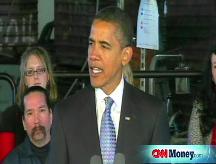Tax cut plans: Sizing them up
Senate Democrats' tax-related proposals track many of those in the House economic recovery package but sometimes differ in scope.
NEW YORK (CNNMoney.com) -- The Democratic leadership of the Senate Finance Committee on Friday released a $275 billion proposal of tax cuts aimed at reviving the economy.
The Senate Finance legislation, which will be debated and amended by the committee on Jan. 27, will be part of the Senate Democrats' overall economic recovery package.
The Senate tax plan shares many elements of a bill approved by the House Ways and Means committee earlier this week. But there are differences.
Make Work Pay credit: Both bills provide for a Make Work Pay credit worth $500 per worker ($1,000 per joint filers). The income limits to receive the full credit are the same in both bills ($75,000 or less for individuals, or $150,000 or less for couples filing jointly), but the two bills phase out the credit at different rates.
Under the House bill, those who make more than $75,000 but less than $100,000 (or $200,000 for couples) would get a partial credit. But under the Senate proposal, only those making less than $87,500 ($175,000 for joint filers) would be eligible for a partial credit.
This Senate provision would cost the Treasury $3 billion less over 10 years than the House bill.
Child tax credit: Both bills also allow a temporary increase in the amount of the child tax credit that would be refundable, but the Senate's increase is smaller, costing $8 billion less than the House version.
Help for the unemployed: Both bills call for the government to subsidize health care coverage for workers who lose a job.
In a departure from the House bill, the Senate Finance proposal also includes a $4.7 billion measure that would temporarily suspend the taxation of unemployment benefits.
Business loss tax break: Both the House and Senate bills broaden businesses' ability to write off their losses by expanding the so-called net-operating loss carryback provision.
But the Senate's expansion is larger, costing $2 billion more than the House's version.
Energy tax break: The Senate proposal includes an $11 billion measure to make it easier for businesses to claim valuable tax credits for investing in energy. The House bill does not include this proposal.
It would extend the number of years companies may apply an energy credit to their prior years' income, and it would allow them to apply the credit to 100% of their income, up from 25% currently, said Clint Stretch, Deloitte's managing principal of tax policy. The provision would be in effect for tax years 2008 and 2009.
When a company isn't making a lot of money, taking a income-based tax credit becomes much less valuable to them than taking it in years when they make a lot of money. The Senate provision will provide incentives for those companies to make energy investments this year, even if their income statement is dismal, because they know they can get cash back from the government because the credit can be used against income from prior years.
"It's a big pump of money [to companies] right away," Stretch said.
The Senate Finance bill released Friday is far from the end in the Democrats' quest to have legislation ready for President Obama's signature by mid-February.
The Senate Appropriations Committee late Friday put forth its $365 billion piece of the economic recovery package.
Next week, the Finance Committee may make changes to the proposal before sending it to the Senate floor for a vote. Ranking Member Charles Grassley, R-Iowa, put out a statement Friday noting that he will push hard for revisions.
"The more that the provisions of the bill stimulate activity in the private sector and the less that they run up the deficit with slap-dash government spending and a big entitlement expansion, the better," Grassley said. "Job creation has to be the top goal, along with other help for families who are hurting, and I'll be supporting amendments to move this massive bill in that direction."
Republicans presented Obama with their alternate stimulus package on Friday, which is much more heavily weighted toward tax cuts than spending.
The next stage after the House and Senate vote on their respective bills the two chambers will need to reconcile the differences between their proposals. ![]()



